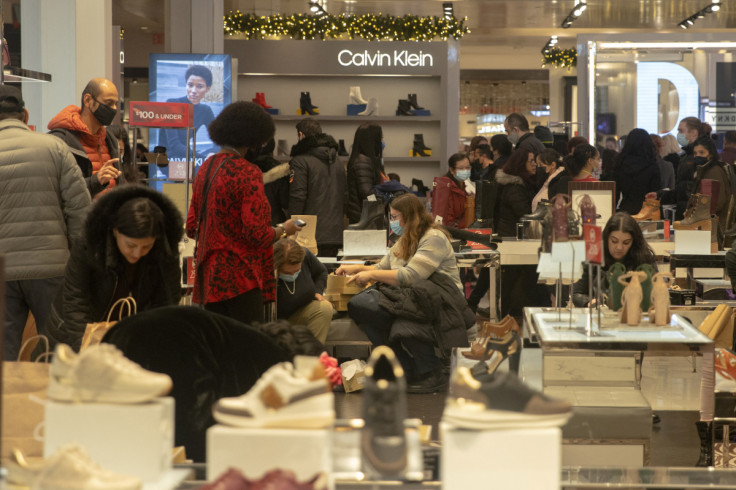UK Shoppers Anticipate Reduced Black Friday Purchases Amidst Cost of Living Crisis
The cost of living crisis has caused consumers to be more wary of buying non-essentials this Black Friday due to inflation after the pandemic.

As the much-anticipated Black Friday shopping extravaganza looms, UK shoppers are expected to exercise caution, with many planning to scale back on their purchases due to the ongoing cost of living crisis.
The economic challenges faced by households across the country are reshaping consumer behaviour, turning what is traditionally a peak shopping period into a more restrained affair.
The cost of living crisis, marked by surging inflation, rising energy prices, and increasing household expenses, has created a financial strain on families throughout the UK.
British consumers are projected to increase their spending slightly in comparison to 2022. However, data suggests that, when accounting for the impact of inflation, the volume of goods purchased will decline.
As a result, consumers are approaching Black Friday, known for its enticing discounts and promotional offers, with a more measured approach.
Economic experts and retail analysts predict a significant shift in consumer spending patterns during this year's Black Friday event.
Instead of the usual surge in purchases, there is an anticipation of a more subdued atmosphere as shoppers grapple with the economic uncertainties brought on by the cost of living crisis.
According to an analysis conducted by GlobalData for Vouchercodes, an estimated £8.7 billion is anticipated to be spent between Friday morning and Monday night. This represents a marginal 0.4 per cent increase from the previous year.
In contrast, the British Retail Consortium trade body reports a 3.4 per cent inflation in non-food items for October.
To manage excess stocks of clothing and footwear resulting from a warm autumn start and amid cautious spending on non-essentials due to elevated food and energy costs, retailers have been offering discounts for several weeks.
Marc Pettican, leader of Barclaycard Payments, the debit and credit card operator, said: "Spending growth continues to lag behind inflation, as value-seeking consumers hunt for bargains.
"This could either be a sign that cost of living pressures will make cautious consumers reluctant to part with their cash, or could signify that shoppers have been holding out for discounts, boosting the demand for deals. Naturally, retailers will be hopeful for the latter."
The rising cost of essential goods and services has left many households with diminished disposable income, prompting a reevaluation of spending priorities.
While Black Friday has historically been a time for consumers to snag bargains and splurge on discounted items, this year may witness a more strategic and mindful approach to shopping.
Retailers, in turn, are adapting to this shift in consumer behaviour. Some have acknowledged the prevailing economic challenges and are responding by adjusting their marketing strategies for Black Friday.
Rather than solely focusing on large-scale discounts, retailers are emphasising value for money and highlighting essential items that address the practical needs of consumers.
The sombre outlook follows a 2.7 per cent year-on-year decline in total retail sales last month, as reported by the Office for National Statistics (ONS). Sectors particularly impacted include clothing and household goods.
In contrast to online retail, physical stores have demonstrated more resilience, partly attributed to mounting concerns regarding online scams, escalating delivery expenses, and scepticism about the actual extent of discounts available.
Additionally, a growing confidence among consumers to visit crowded shopping areas has contributed to the relatively better performance of brick-and-mortar stores, as apprehensions about contracting Covid continue to wane.
The footfall in high streets, shopping centres and retail parks is anticipated to increase by up to two per cent, as per Diane Wehrle from the advisory firm Rendle Intelligence and Insights.
This figure remains approximately 10 per cent lower than pre-Covid levels. She attributes this partly to the notion that "the less money you have, the more you want to make a considered decision".
The UK government's response to the cost of living crisis is also under scrutiny, with calls for measures to alleviate the financial burden on households.
Policymakers are urged to address issues such as rising energy costs and inflation, which are key contributors to the current economic challenges faced by citizens.
As Black Friday approaches, the anticipation is not just about blockbuster deals and shopping trends but also about the resilience of UK consumers in navigating a challenging economic landscape.
The outcomes of this year's Black Friday could provide valuable insights into the evolving dynamics of consumer behaviour amidst a cost of living crisis, shaping the future strategies of retailers and policymakers alike.
© Copyright IBTimes 2025. All rights reserved.






















